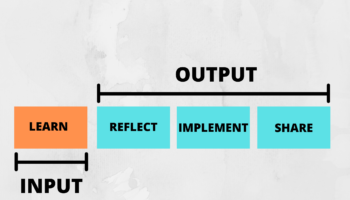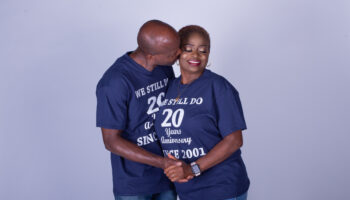Your belief system will impact the results you accomplish
“The only thing that’s keeping you from getting what you want is the story you keep telling yourself.” — Tony Robbins
For as long as I can remember, I’ve always felt uncomfortable about sharing what I know, and I have often resisted contributing to a group discussion. While I can’t completely recall specific instances where I was ridiculed for answering questions incorrectly or for making contributions in a class discussion in my primary and secondary school days, I recall it was common practice for kids to ridicule other kids. I was involved in this and I was also a victim. We all participated in it. It was a fun thing to do, we thought at the time. A few times, we got in trouble for this, and other times, we escaped without punishment.
As a grew older and got more mature, I abstained from this childish behavior of ridiculing others in my later years in secondary school. However, I never really got over my own fear of sharing my knowledge or participating in class discussions. This continued throughout my university days and most of my work life in Corporate Nigeria and Corporate Canada. And I recall some of the reasons why:
- I felt I did not know enough to share
- I thought I was not smart
- I was fearful of being ridiculed
- I thought everyone already knew what I was about to share so I did not feel compelled to share with them what they already know
- I was concerned they will ridicule my accent (in Canada)
- I was worried I did not have a strong command of the English language to communicate effectively
- I feared I will be misunderstood
- I feared I will offend someone
- I feared I will be disliked
I struggled academically in my primary and secondary school days so I believed I was not smart. While my academic performance went from mediocre to average and to above average as I progressed through undergrad and graduate school my belief system did not change as much. I was still stuck believing I was not smart.
Recently, I began to realize these are the core beliefs I had about myself and others. These core beliefs have been holding me back all these years. They have guided the decisions I’ve made in life. They have affected how I interpreted the events in my life and they have certainly influenced my thinking, feeling, and behavior.
We all have core beliefs that guide the decisions we make and these beliefs impact us in many ways. Your healthy beliefs serve you well. But, the unrealistic, self-limiting beliefs you hold onto can hold you back from reaching your greatest potential.
In an article titled, “The Impact of Limiting Beliefs” by Alissa Finerman, she noted that our brains can produce as many as 50,000 thoughts per day. Ninety-five percent of these thoughts are repeated daily. You decide how you think and what becomes a can or can’t. Your thoughts become your beliefs which, in turn, become your mindset. Your mindset fuels your actions, which create your reality.
Alissa goes on to illustrate the chain effect that your thoughts can have on your life: Words>>Thoughts>> Beliefs>>Mindset>>Actions>>Results.
It is clear that our belief system has an impact on the results we accomplish in life. Therefore, it’s important to acknowledge your core beliefs and examine which ones might be inaccurate and unproductive so you can take appropriate steps to let go of the beliefs that are limiting your potential.
Amy Morin, author of “13 Things Mentally Strong People Don’t Do” in an article published on Inc.com classified unhealthy and unproductive core beliefs into the following 3 broad categories:
- Unhealthy Beliefs About Yourself — This happens when you conclude that you are a loser, a failure, unlikable, or incapable. This belief system will prevent you from doing your best. Even overly optimistic beliefs can be unhealthy. Thinking you’re the best at everything you do or that you are above the rules can be just as dangerous to your well-being as an exaggeratedly negative core belief about yourself.
- Unhealthy Beliefs About Others — When you believe everyone is against you, untrustworthy, or manipulative, it will be impossible to develop healthy relationships. Similarly, believing everyone can be trusted or that everyone is a kind person can cause you to be taken advantage of or to get into relationships that aren’t good for you.
- Unhealthy Beliefs About the World — Assuming that you can’t succeed in today’s world or thinking that the world is too dark of a place to ever be happy will take a toll on your life. On the flip side, minimizing social problems and looking at the world through rose-colored glasses isn’t helpful either.
Unfortunately, we all have these unhealthy beliefs to varying degrees. And in many cases, we often think that all of our beliefs are 100 percent accurate. We hold on to them and we end up living irrational and unproductive lives.
Unhealthy beliefs will lead to unhealthy and sub-optimal results.
Unhealthy beliefs lead to unhealthy habits. And unhealthy habits produce negative outcomes that ultimately reinforce your unhealthy beliefs. It’s a vicious cycle that can be tough to break.
Amy goes on in her article to provide the following examples of how self-limiting beliefs turned into self-fulfilling prophecies from real examples from her therapy office:
- A woman believed she was unlovable. She jumped from one unhealthy relationship to the next over and over again. Every person she dated treated her poorly, which reinforced her belief that she was unlovable.
- A gym owner believed that small businesses couldn’t compete in today’s world. Membership dwindled, but rather than do anything different, she resolved that her business was going to fail. She found herself in a financial crisis and she concluded that she was going to have to close her doors because big chains were putting her out of business.
- A man believed that everyone was inherently bad. Even when people were kind to him he assumed they had ulterior motives. He kept everyone at a distance and never developed trusting relationships. Any time he felt he wasn’t treated fairly, he thought it was evidence that further proved his beliefs that people are bad.
So, self-limiting beliefs have devastating consequences. As a result, we must make effort to first recognize them, and second, take active steps to combat them.
How can you change your self-limiting beliefs?
Without a doubt, changing a self-limiting belief is hard work. It is tough. And the reason for this is that you’ve likely held on to these beliefs for such a long time.
So, you have to confront these unhealthy beliefs head-on and start replacing them with new healthy beliefs through reframing.
In the article referenced above, Alissa provides the following examples of limiting beliefs and how you can reframe these beliefs:
- For a job seeker: I’m terrible at interviewing. After one or two interviews that don’t go as well as you had wanted, it’s not rational to conclude that you can’t interview. Reframe and focus on where you can improve and prepare two to three stories that share your strengths and how you best contribute.
- For an emerging leader: Because I am so young and managing others twice my age, people on my team don’t respect me. Age doesn’t equate to respect. Reframe and realize that you can earn someone’s trust and respect regardless of age and focus on the steps you can take to build respect.
- For a manager: I’m not good at managing people and having tough conversations. Having one tough conversation with a challenging team member that didn’t go well doesn’t mean you don’t have good management skills. Reframe and realize that managing is a process and takes time to learn and develop your skills and that you have more work to do with tough conversations.
Confronting your limiting beliefs and reframing is one of the best ways to change your beliefs. This was what I needed to start shifting the self-limiting belief that I was not smart enough to share what I know with others. The belief that kept me incapacitated for such a long time.
In late 2016, I started chipping away at this limiting belief as I started teaching, first at the kids’ ministry at my church, later at the chess club, then at the university and now I am running training programs regularly, and sharing my stories on stages and on podcasts. I committed to teaching even as I was terrified of the thought of doing so initially.
As I put myself out there teaching, I slowly began to see evidence that the self-limiting belief I was holding on to was not supported by facts.
I could actually teach.
I could be understood.
I am smart.
So, reframing and taking action to confront your limiting beliefs is essential as you work to shift your mindset. In her article, Alissa suggested the following steps for recognizing your self-limiting beliefs and replacing them with healthy beliefs:
- Bring awareness to the words you use. Does the belief help you move forward or limit your potential?
- Be honest. Is the belief or story you are telling actually true?
- Stick to the facts. Saying you are a young leader is true but saying you are a young leader so, therefore, people won’t listen is not accurate. Is there evidence behind it?
- Take a pause before you finish the sentence with a belief that does not serve you. There is a big difference between telling yourself, “I don’t have experience starting a company” versus “I don’t have experience starting a company so therefore I can’t do it.”
Final Thoughts
When next you’re confronted with a new challenge or a difficult decision, ask yourself — what are you afraid of? Are your own beliefs keeping you small? You may be able to recognize the limitations you place on yourself are unfounded or lack evidence, and you may find a new, positive momentum toward achieving the outcome you desire.
By constantly recognizing your self-limiting beliefs, challenging them, and reframing them, you will begin to train your brain to see yourself, other people, and the world in a more accurate light. This will transform your self-limiting beliefs into healthy beliefs. And these healthy beliefs will lead to more productive results, results that will ultimately allow you to reach your full potential.






